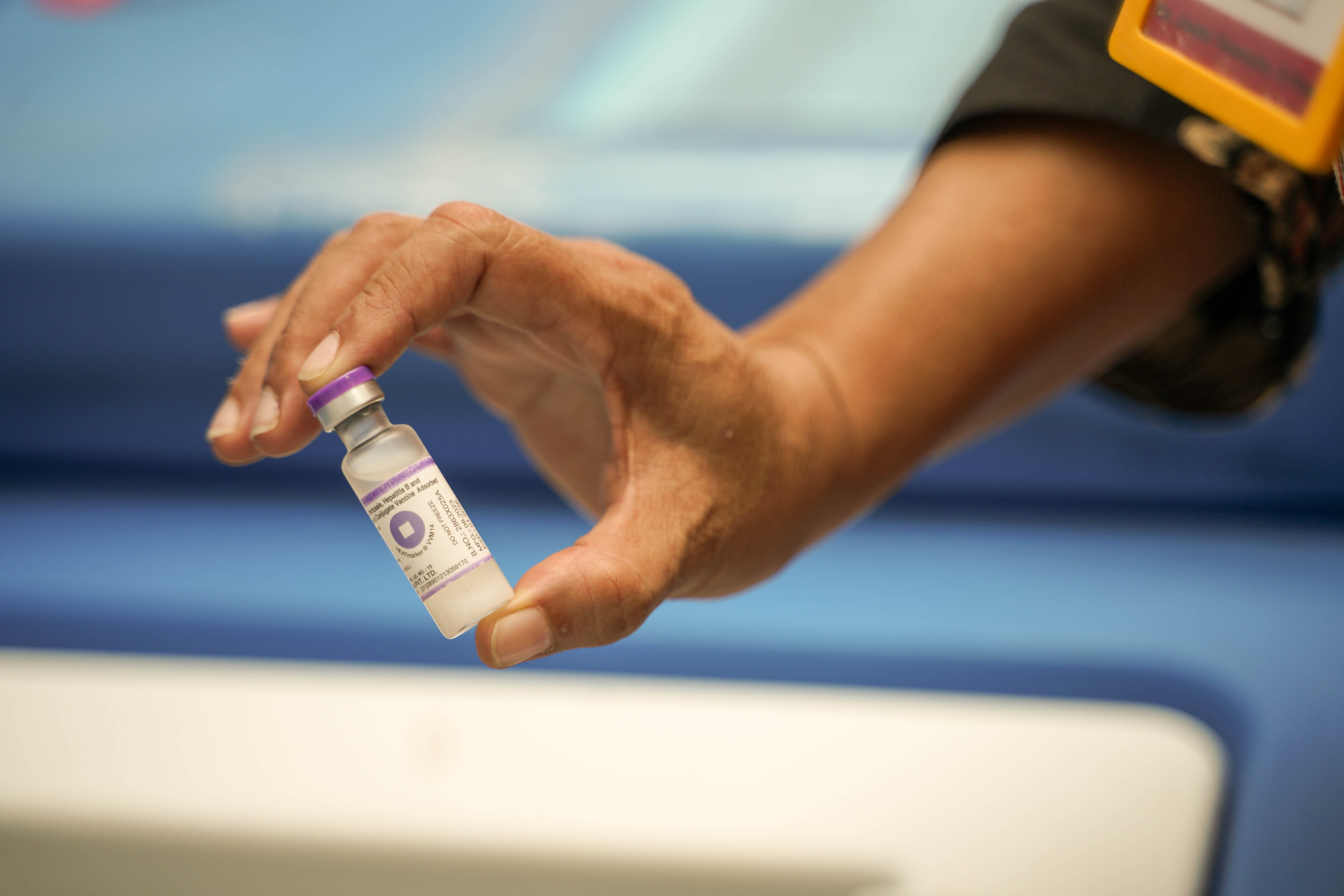Reaching the Remote: Delivering Immunization with a ‘SMILE’
February 7, 2024
Beyond the turquoise bays and lush jungles of Indonesia, each island holds its very own story. For Ibu Jouke and Ibu Dora, women healthcare workers at the Community Health Center (Puskesmas) in Bahu village, Northern Sulawesi, a different battle unfolded: ensuring every child has access to a life-saving routine and vital childhood immunization, no matter how remote their village is.

The deployment of vaccine and cold chain manager in Puskesmas Bahu, North Sulawesi, to ensure vaccine quality.
"It is heartbreaking seeing a child miss out on routine immunization due to logistical challenge," Ibu Jouke said, her voice etched with concern. "The mountains, the lack of adequate transport infrastructure... it felt like an impossible climb."
Before the SMILE initiative entered the lives of Ibu Jouke and Ibu Dora, their days were filled with anxiety and uncertainty. Every immunization drive was a logistical nightmare. Vaccines had to be transported across treacherous mountain roads in unreliable vehicles, risking spoilage due to fluctuating temperatures. Stock levels were a guessing game, often leading to frustrating shortages and missed vaccinations. Fear of stockouts kept them up at night, knowing a single missed dose could put children at risk of preventable diseases.
Communication between Puskesmas and suppliers was slow and cumbersome, making it difficult to coordinate efforts and share resources. Data collection was manual and human error-prone, leaving them blind to the bigger picture of immunization coverage in their community. The weight of responsibility hung heavy, and the feeling of powerlessness in the face of logistical challenges was overwhelming. "We knew there had to be a better way," Ibu Jouke once expressed with both hope and despair.
UNDP acknowledged this issue and recognized the urgency of addressing the systemic challenges faced by healthcare workers like Ibu Dora and Ibu Jouke. The SMILE app seamlessly integrated into their workflow. After successfully implemented for tracking and monitoring more than 400 million covid-19 vaccine, the SMILE app also helping as a platform to centralized real-time tracking of routine vaccine and immunization distribution, monitoring stock levels, and streamlining communications between Puskesmas and suppliers. The integration of technology aimed not only to simplify the process but also to empower healthcare workers with the tools needed to overcome their initial technological barriers.
Entered the SMILE initiative, not just an app, for healthcare workers like Ibu Jouke and Ibu Dora, it is a lifeline for children in their community. "It's like having a map to every child," Ibu Dora beamed, her eyes lighting up. "We can track vaccines, see shortages, and make sure no child gets left behind."
But challenges arose. Frustration crept in, mirroring the wrinkles on Ibu Jouke's brow. "The majority of us were not tech-savvy," she admitted. "The buttons, the screens, the lack of internet connection... it felt overwhelming." The SMILE team acknowledged this need and conducted training specifically for healthcare workers like Ibu Jouke, empowering them to navigate the app's features and ultimately enhance their ability to deliver personalized care. Prior to the training, Ibu Jouke remained undeterred, determined to overcome the technological hurdles. With unwavering perseverance, she sought assistance from peer mentors and dedicated herself to mastering the intricacies of the digital realm.

Peer mentoring with UNDP’s assistance bridges the technological gap for healthcare workers.
"They were patient, kind," Ibu Dora recalled. "I remember they tried to speak our language, not just with words, but with gestures, with smiles, with an unwavering belief in our ability to learn. They showed us step-by-step, like holding a child's hand, guiding us through the unfamiliar terrain of incorporating technology in our daily work, until the buttons and screens became less like daunting obstacles and more like tools waiting to be wielded."
Slowly but surely, understanding bloomed among the healthcare workers community. Ibu Jouke's fingers danced across the phone screen, navigating the SMILE app with newfound confidence. "It's empowering," she declared, her voice ringing with pride. "Now, we're part of the solution, not just witnesses to the problem."

(Left to right) Ibu Dora, a pharmacist, and Ibu Jouke, daily SMILE user, submitting data to the SMILE app for real-time vaccine stock update.
Resident Representative of UNDP Indonesia, Mr. Norimasa Shimomura acknowledged SMILE's role. "I'm pleased to see that our collaboration on SMILE application with the Ministry of Health has forged ahead to support the nation’s routine and vital childhood immunization program which will help tens of millions of vaccine recipients. We are confident that SMILE will become the best system for keeping track of vaccines and health supplies which in turn will enhance the country's health system." The impact of Ibu Jouke and Ibu Dora's dedication, amplified by the power of technology, has paved the way for a future where every child, no matter how remote, could receive the vital protection of routine immunization.
Standing tall and proud, these women in healthcare of North Sulawesi, their dedication intertwined with SMILE's transformative power. A tapestry woven with hope, reaching beyond the islands, a testament to the UNDP's unwavering commitment: leaving no one behind.
This is not just a story of technology, but a story of lives changed, echoing across the Indonesian archipelago and leaving a significant mark in the world.

 Locations
Locations